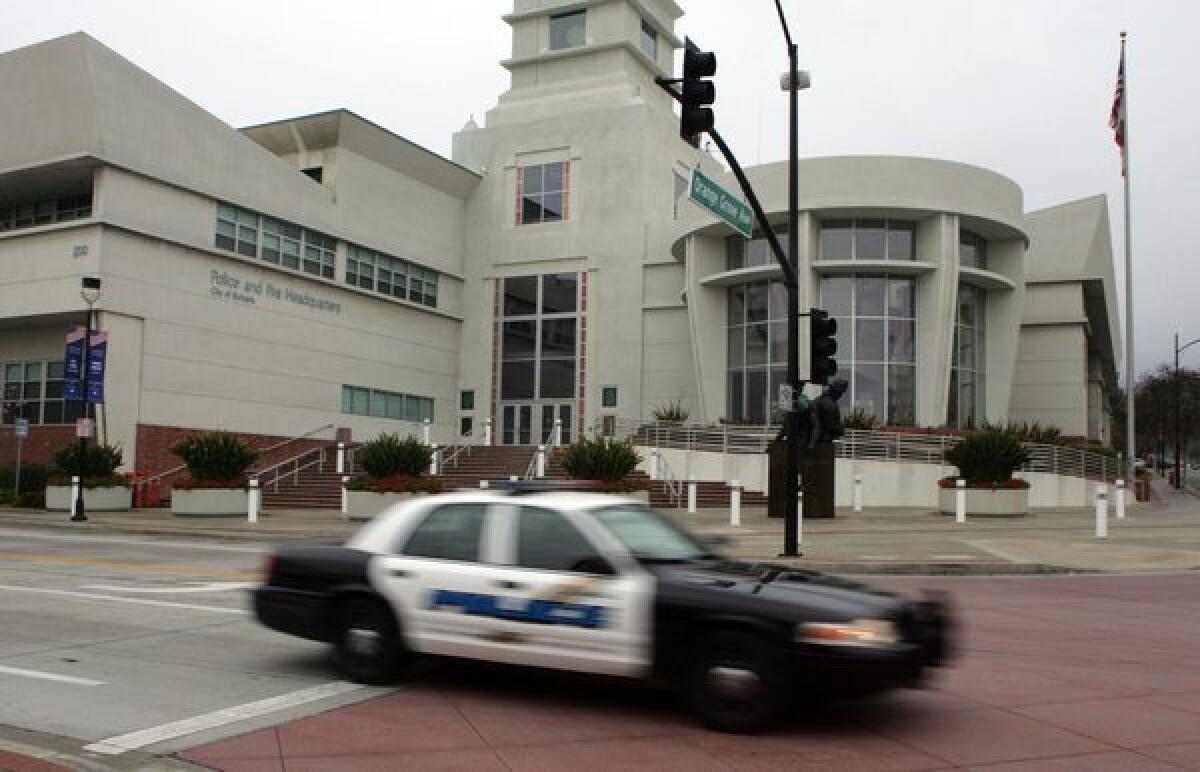Court ruling favors police officers who report on-the-job misconduct

- Share via
SAN FRANCISCO — In a reversal of past decisions, a federal appeals court decided Wednesday that California police officers may be protected by the 1st Amendment when they report corruption and misconduct within their departments.
An 11-judge panel of the U.S. 9th Circuit Court of Appeals revived a lawsuit by Angelo Dahlia, a former Burbank police detective, who said he was punished for telling the Los Angeles County Sheriff’s Department about alleged brutality in the Burbank Police Department.
Wednesday’s ruling protects police officers who go outside the chain of command to report corruption and may result in compensation for officers who prove that they were punished for their whistle-blowing. Prior court rulings had barred California officers from suing for 1st Amendment retaliation.
A lower court threw out Dahlia’s suit on the grounds that he reported the misconduct as part of his official duties, not as a private citizen expressing free speech. A three-judge 9th Circuit panel reluctantly agreed last year, declaring that it was bound by a 2009 precedent.
But the larger panel overturned that precedent and decided that police officers, in some instances, may be entitled to sue in federal court for being penalized for speaking out about misconduct.
“It is relevant to the resolution of Dahlia’s case that Dahlia disclosed misconduct to LASD in contravention of the numerous threats and admonitions from his superiors not to reveal the misconduct to anyone,” wrote Judge Richard A. Paez, a President Clinton appointee. “He defied, rather than followed, his supervisors’ orders.”
Dahlia alleged that he witnessed other officers physically abuse suspects who were taken into custody during a high-profile robbery probe that began in late 2007. He said he saw a lieutenant grab a suspect by the throat, put a gun under his eye and threaten him.
Dahlia also reported that he heard yelling and the sound of somebody being hit and slapped in a room where a sergeant was interviewing a suspect.
When Dahlia reported what he had allegedly witnessed to a superior, the lieutenant told him to stop his “sniveling,” he said. Dahlia said he also was ordered not to tell internal affairs officers about what he had seen.
“The physical beatings continued in BPD interview rooms and in the field, evidenced by the booking photos of various suspects,” the court said.
Dahlia eventually reported his alleged observations to the Los Angeles County Sheriff’s Department, and Burbank police put him on paid administrative leave.
The actions of officers involved in the robbery investigation produced an internal affairs investigation that led to several officers being disciplined, according to an attorney for Burbank. At least two were fired.
Dahlia filed his lawsuit while on leave, charging that it amounted to retaliation. A lower court said a paid administrative leave was not punishment. Wednesday’s decision said it could be retribution, depending on the facts.
Dahlia was eventually fired for allegedly giving conflicting accounts to the Sheriff’’s Department and to Burbank’s internal affairs officers.
The Supreme Court ruled in 2006 that public employers may not be sued for free speech retaliation if the employee’s communication was part of his or her job duty.
Three years later, a three-judge 9th Circuit panel ruled that California police officers are doing their official duty when they investigate and report on police corruption and may not sue for 1st Amendment retaliation.
In overturning that 2009 ruling, the 9th Circuit said the decision mistakenly failed to require a fact-specific examination of the scope of an officer’s duties.
Just because an officer’s job description says he has a duty to report misconduct does not mean that an officer’s whistle-blowing is never protected by the 1st Amendment, the court said.
An officer’s speech is likely to be protected if the communication was made outside the chain of command, in violation of a superior’s orders, and included a report of corruption or misconduct within the department, the court said.
The en banc panel unanimously decided to revive Dahlia’s lawsuit, but two judges said they agreed to permit Dahlia only to amend his lawsuit.
“Federal courts have no business managing the daily activities of police departments,” wrote Judge Diarmuid F. O’Scannlain, joined by Judge Alex Kozinski, both President Reagan appointees.
“The malfeasance by officers of the Burbank Police Department which Dahlia witnessed and the threats and intimidation he endured — if true — are shocking and intolerable,” O’Scannlain wrote. “Yet we must stay our collective hand.”
Scott Michelman, an attorney with Public Citizen, which advocated for Dahlia in the appeal, said the ruling “should hopefully encourage whistle-blowers to come forward and report abuses or misconduct without fear of retaliation.”
Richard Terzian, who represented Burbank in the case, said the city did not retaliate against Dahlia, whom Terzian said also has a whistle-blower complaint pending in arbitration. Terzian noted that a federal 1st Amendment case, unlike a whistle-blower complaint in state court, can result in attorney fees for the plaintiff.
Terzian said the Burbank department’s probe of misconduct spawned about half a dozen lawsuits by officers who were disciplined. None of those who were allegedly beaten sued, he said.
“As far as I know, it is a very clean department” now, Terzian said.
More to Read
Sign up for Essential California
The most important California stories and recommendations in your inbox every morning.
You may occasionally receive promotional content from the Los Angeles Times.










